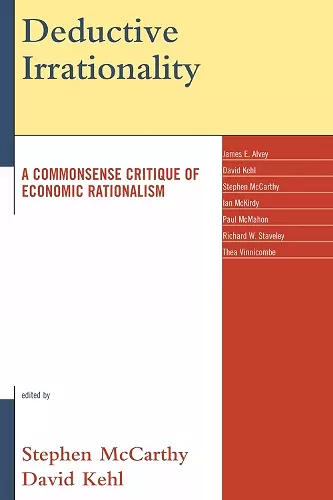Deductive Irrationality
A Commonsense Critique of Economic Rationalism
Stephen McCarthy editor David Kehl editor
Format:Paperback
Publisher:Lexington Books
Published:29th Apr '08
Currently unavailable, and unfortunately no date known when it will be back
This paperback is available in another edition too:
- Hardback£102.00(9780739116241)

Deductive Irrationality examines and critiques economic rationalism from the perspective of political philosophy. The essays in this collection analyze not only the work of founders of the discipline of economics, but also political philosophers influential in this founding and select contributors of seminal theories in modern economic thought—namely, Thomas Hobbes, John Locke, Adam Smith, Alfred Marshall, John Maynard Keynes, Friedrich Hayek, Gunnar Myrdal, Robert E. Lucas Jr., and John F. Muth. The main theme linking all of the essays together is that economics is a product of modern rationalism and shares with that rationalism the belief that the only real knowledge is scientific knowledge. Derived from a scientific method modeled on mathematics, this method gives both modern political science and modern economics their abstract character. Adam Smith's contribution to Western thought was more than mere economics; his innovations and his variance from previous thinkers follows Machiavelli in finding human nature in the realistic conception of examining men as how they are, rather than the classical view that we should look to the idea of man's formal excellence. To Smith, humanity emerges from a desire for self-preservation, where every worker competes to exchange the fruits of their labor with that of others. The result is a gap between the world of "common sense" and the world of theory that practitioners in both fields no longer truly understand. By adopting the perspective of political philosophy, the contributors take an approach that is alien to most economists, and in doing so address many of the currents and tensions that underlie modern economic theory and, by implication, the rational choice theory in political science.
In their study of economics as rooted in the scientific rationalism of early modern political philosophy, Richard Staveley and his students offer a profound critique of economics as a purely abstract or mathematical science that is detached from reality as we know it by commonsense experience. Anyone who wants to understand the dubious philosophical assumptions of economics—and of the other social sciences as influenced by economics—must read this book. -- Larry Arnhart, Northern Illinois University
This timely, original, and thought-provoking collection of essays, taken as a whole, constitutes a fundamental critique of the theory and the practice of economics. It argues that the much admired theoretical and quantitative sophistication of modern economics is a dangerous illusion that gives rise to bad and potentially disastrous policy prescriptions. The essays attempt to lay bare the source of this illusion—a longstanding and mistaken view of the scientific method—and to show how it has influenced economists since Adam Smith. -- Peter McNamara, Utah State University
Ideal for students of public policy, this book peels back the protective covering of modern political economy, revealing the inner logic of economic rationality: a logic of economism with its own set of arbitrary and unsustainable policy preferences. Modern political economy has rarely received such an anatomy of abstraction, delivered through concrete case studies of public policy frameworks devised by the great liberal theorists of economic rationality: the Lockean liberals judged against standards of pre-liberal commonsense found in Aristotle's political science. What would Aristotle think of modern political economy? You have the answer here in your own hands, and it is not all negative. -- John Uhr, Crawford School of Economics and Government, Australian National University
ISBN: 9780739116258
Dimensions: 231mm x 153mm x 21mm
Weight: 426g
260 pages